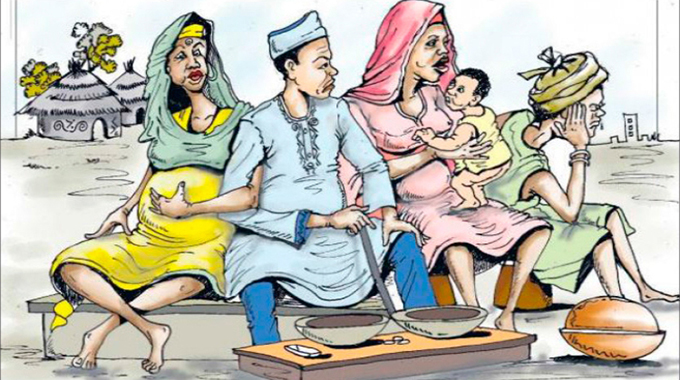Tsikamutandas: Tricksters stealing from villagers
Isdore Guvamombe Reflections
We were confronted by kilometre after kilometre of apparently empty bush, then a scattering of mud-and-pole huts, dotted European-style houses, a few criss-crossing gravel paths, cattle grazing on the verges of the road, and precious little else. It was in late August and the land of milk, honey and dust — or Guruve — was awash with premonition ceremonies, others call the process. Our destination was Nyakapupu towards the western border with Mhangura.
Adults officiated throughout the night, singing and dancing, but spent the day resting, drinking and engaged in light domestic chores.
Young boys played with the drums during the day, imitating the cross rhythms the adults had been playing all night long, but the youngsters’ beat was clearly immature to the experienced ear.
Each of the four drums had a unique vocal stylisation and you hardly got one drummer who could beat each drum with the same dexterity. When the drumbeat faltered towards discord, it was immediately taken to the fireplace, where a temperamental bonfire taught it to behave and to retune its vocal chords.
The cow hide on the drum listened fervently to the licking, kissing fire flame. A veteran drummer’s palms were as hard as the foot of an elephant. If you were unfortunate to be slapped with one such hand, you would crack your cheeks and break your jaws. Your sight dimmed and you would see stars.
At the end of the tarred road, the gravel stretch snaked up and down. Our vehicle raised dust, swarming the aftermath. Decaying huts and the sights of abandoned villages are soon lost in the dust. And, so are the old fields, the traces of ancient cultivation.
Finally we arrived.
The first port of call was the secluded house of the oldest woman in the village, the great grandmother of the family.
She sat on a reed mat under the shed, provided by the eaves of the roof thatch. Behind the hut was the sound of a pounding pestle. Someone must have been preparing groundnut paste or come concoction.
Smoke filled the doorway and her face was wrinkled beyond imagination. A combination of old age, black dress and the smoke made her look perfectly otherworldly. The bloodshot eyes looked like two evil holes, from where rivulets of fluid ran down the flabby cheeks.
Her feet were cracked, her skin bone-dry and extremely dark. The hair was wiry. She was frail and spoke with a shrieking, but authoritative voice.
She insisted on us getting into the hut to appease the spirits. One is only welcomed by the spirits when you enter a house, so the villagers believe. Soon the smoke had slightly subsided and we could see somewhat clearly inside the hut.
Soot hung all over and lay thick on most objects — pot, plates, cups and all. The soot had tainted even the normally glossy coats of the rats. The rats were tinged grey-brown.
One such rat made darting runs between clay pots and water buckets, up the wall then to the roof.
The roof, the roof, the roof! On the roof were dangling fingers of was soot. Some of the soot hung down in strings, like the locks of a Rastaman.
Her son, Muchemwa (the mourned one) had long left for another area where he had become a major traditional healer. His name had been adjusted to Tsikamutanda. This was more aligned to his miracle realm, where he was a witch-hunter.
He had taken the country by storm. During his witch-hunting escapades, he made a fortune in cattle and cash. He bought cars. He was living a dream.
On this particular day, he had come to see his mother and also to be part of the premonition ceremony. But there was no work for him.
He had a huge car and a driver.
The car became an attraction in the village. Women and children gathered around the spectacle. Villagers whispered that the car could talk.
Things changed immediately when his wife arrived. Tsikamutanda’s face changed and he became visibly shaken. Something was amiss. She was fuming.
He tried to take her aside and avoid a public spectacle, but she would have none of it. She had come to destroy him.
Villagers started gathering around the couple. She went ballistic about his flirtation with a female member of his entourage. He had impregnated her.
The crowd soon gathered they were divorcing. He tried to calm her down, but she stood her ground, shouting, pointing fingers. Shouting. Shouting. Swearing! Shouting. Swearing. Slapping. Violence!
The party looked at her in consternation.
“You lie to the people. Today I am telling all these people here that you are not genuine, but you use juju.
“You are lucky I found you in the village far away from the people you normally hang around with. People don’t know you got this juju from Espungabera in Mozambique. In fact, I will get you when you are at work.”
Village elders took away Tsikamutanda, who had become visibly irritated and wanted to bash her. She had slapped and spat at him. She had challenged his manhood in public. Do village elders not say manhood is not defined by having the biggest bamboo stick between your legs?
She moved closer to him. Commotion, commotion, commotion! There was shouting, pushing and then quiet, quiet, quiet. Quiet.
Close relatives tried to calm her down and whisk her away. She would not go without demonstrating how her husband cheated imputed witches. One villager agreed to the experiment.
“It is all juju. See this magic in my pocket. Let me demonstrate.” She demonstrated on one of the villagers. “Are you not a witch? Tell people what you have, tell them . . . I said tell them . . .”
The villager started confessing to witchcraft. He shook his head. His stomach rumbled.
“You see, there is nothing. It is all juju! This man is not a witch. But this juju confused him, worked on him. It makes him hallucinate. It instils fear of death in him. This is how you are all cheated.
“Let me remove non-existent goblins from one of you and you will see them. Give me your back. Can anyone give his or her back so that I can demonstrate?”
One young woman offered and on she went. She rubbed the concoction on her back and then used her fingers to pluck out some goblin.
“You see this thing. It does not exist. This is a miracle he uses. This magic makes miracles. I have lived with him for 10 years and I know all his tricks. Is this not a miracle? Is this genuine witch-hunting?
“Do you want me to call a hyena and you see it running here right away?” she asked.
There was chaos and commotion. Laughing, ululating and shouting. Surprise, surprise, surprise!
She was too angry, bitter and out to destroy. She named the godfathers of the prophecy. She let all the secrets out in public. She was unstoppable!
It was embarrassing. It was a shame. It was a spectacle! Soon the engine of the huge car started. It hissed and puffed a cloud of smoke, taking off at tremendous speed.
And dust covered the scene of Tsikamutanda’s humiliation. This scene reminded me of many Zimbabweans who have fallen victim to these con artists.
Many villagers in Zimbabwe have fallen victim to Tsikamutandas, and are losing their cattle and valuable property in the name of paying at cleansing ceremonies. The Tsikamutandas use a combination of magic, trickery and fear in forcing villagers to part with their valuables. Most of them, are youthful boys and girls who invade villages and claim to be cleansing. At the end there is no proof of the cleansing.
A few days after the ceremonies, the Tsikamutandas sell off the beasts cheaply and move to the next village.







Comments